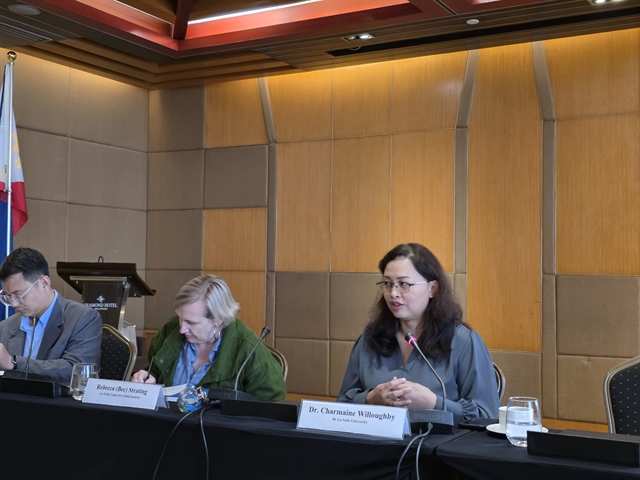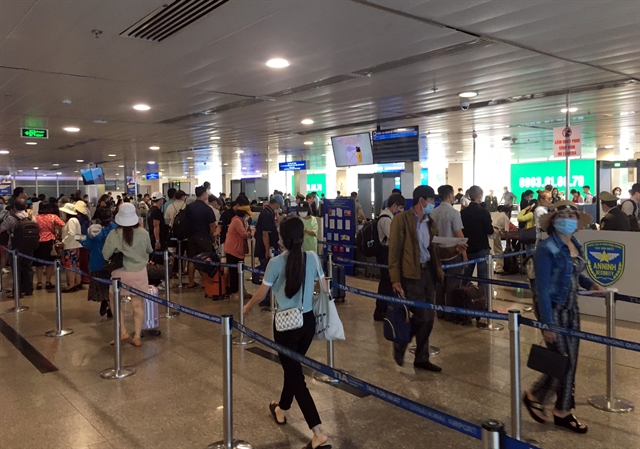 Opinion
Opinion


|
| Security scanning area of the Tân Sơn Nhất International Airport in HCM City. — VNA/VNS Photo Tiến Lực |
Vietnam News Agency spoke with Vũ Tú Thành, Deputy Regional Managing Director and Việt Nam Chief Representative of the US-ASEAN Business Council, on COVID-19 “vaccine passport”, which is expected revive the world’s economy, especially tourism and air travel, but concerns remain because of new variants of coronavirus.
With the uneven pace of COVID-19 vaccinations across the world, what are the risks to the global economy from the vaccine passport initiative?
The initiative has its benefits but the actual implementation of it would not be a smooth ride.
Countries must come to an agreement as to which COVID-19 vaccines are mutually recognised and countries must recognise each other’s technical standards for the vaccine passports.
Then we need to figure out how to deal with fake vaccine passports that have started to show up. A common protocol for the vaccine passport holders between countries must also be set up, like whether the holders would still need to be quarantined upon arrival and for how long, or if the quarantine is waived then should their movement in the host country be free – like pre-pandemic free – or would the travel and destinations would be restricted.
All of these issues are being heavily discussed by organisations that are pushing for the approval of the initiative but little consensus has been reached.
What are the conditions for vaccine passport to be implemented safely and effectively across the world?
All approved COVID-19 vaccines’ efficacy and effectiveness data must be published publicly and we must agree upon a list of acceptable vaccines to be used in vaccine passports – and even in this case, the vaccines must be ranked by effectiveness and efficacy.
A vaccine passport would obviously contain the name of the vaccine that the holder has received, and countries could discuss detailed protocols on which restrictions would be applicable for which type of vaccine based on its efficacy and effectiveness.
The security of the vaccine passport is also another issue with a ‘common framework’ of issuance procedures to make it difficult to fabricate such passports.
Since March, the Prime Minister assigned the health ministry and relevant authorities to study appropriate COVID-19 prevention and control protocols when vaccine passports are implemented. What are your thoughts about the feasibility of this initiative in Việt Nam?
Like other ASEAN member states’ governments, we have advised the Government of Việt Nam to start looking into the issue right now.
We have also advised on the facilitation of business people and executives who want to travel to Việt Nam to do business. Some detailed restrictions could be applied.
The Government has also tasked relevant authorities to look at priority arrivals first (the country still close off its borders against international arrivals, except for a limited number of groups of people) – which are tourists, businessmen, diplomats and Vietnamese citizens stranded overseas. The timeline for implementation of vaccine passport for each of the group could be different, like protocols for tourists could be reviewed later, but businesspeople and guests on working trips to Việt Nam and diplomats from other countries must receive the highest priority.
In addition, the technology platform for COVID-19 vaccine passports could also be used in case of future pandemic and diseases.
If Việt Nam can ‘harmonise’ vaccine passport standards with the rest of the world, the country could be the early adopter of this initiative, which would not help facilitate foreign arrivals into Việt Nam but also enable easier travel for Vietnamese citizens overseas.
For businesses, we recommend that they work closely with the Government, and first and foremost, send their requests and proposals to the Government on their travel needs, especially the entry of highly skilled workers. — VNS




